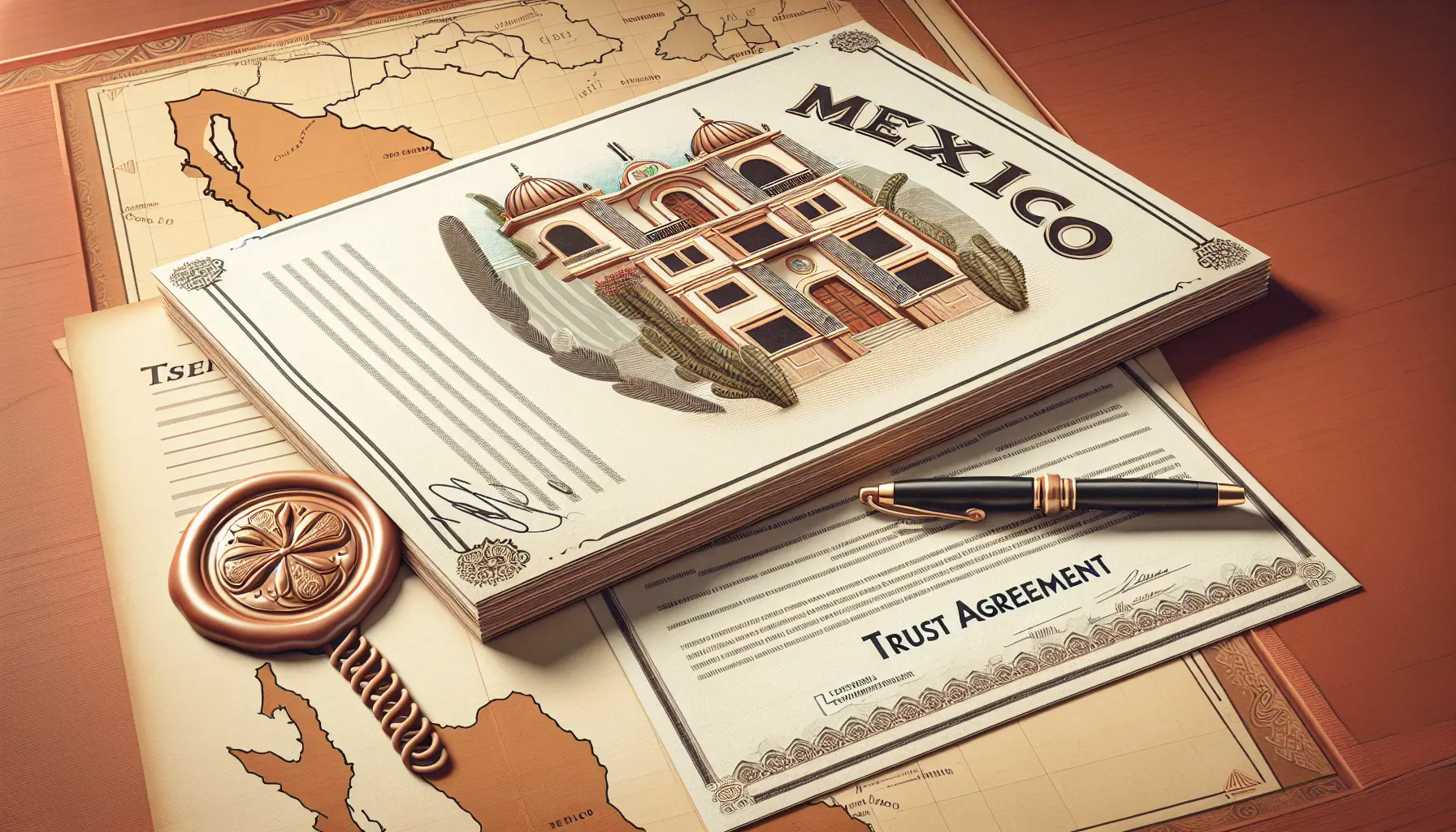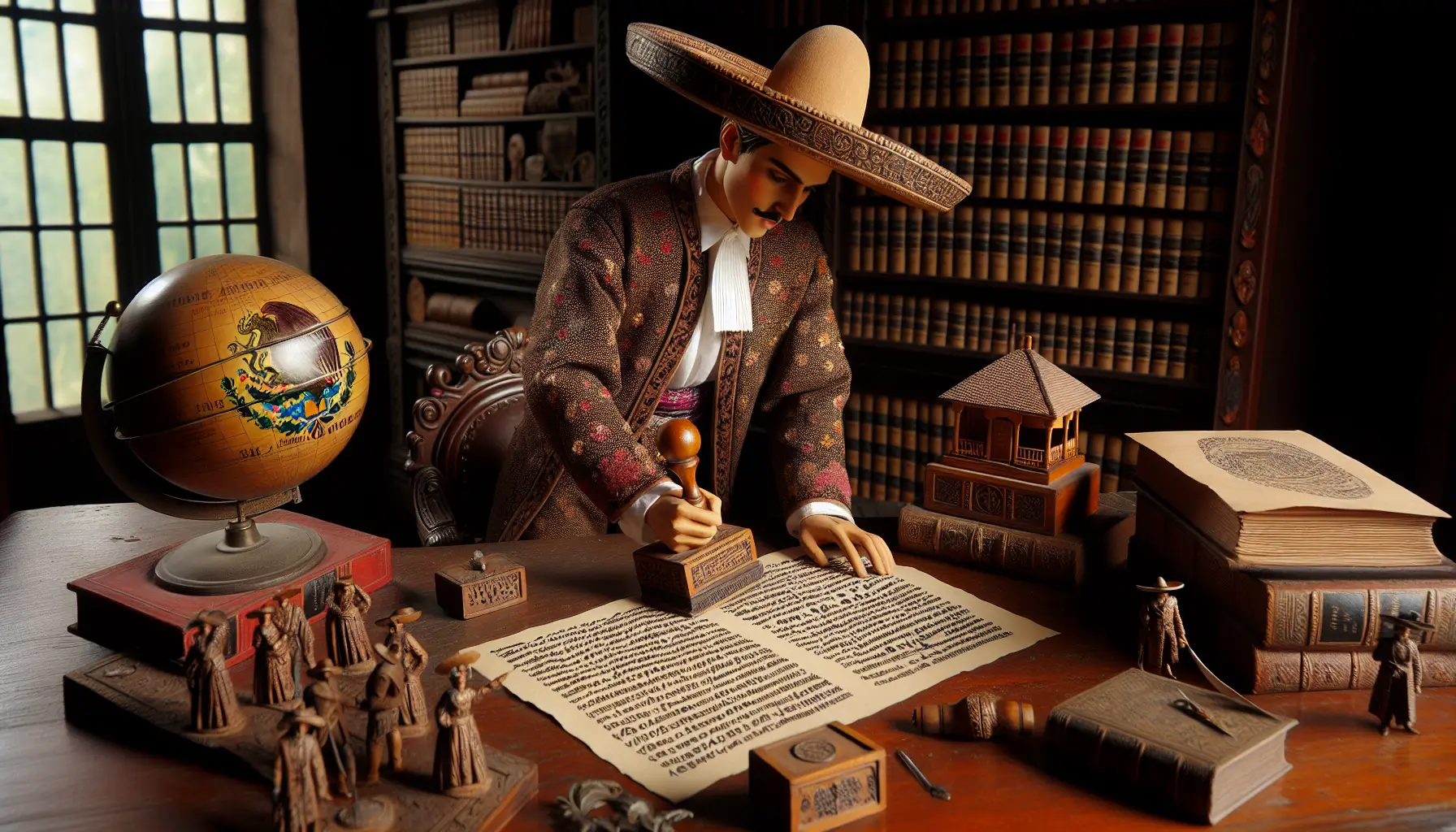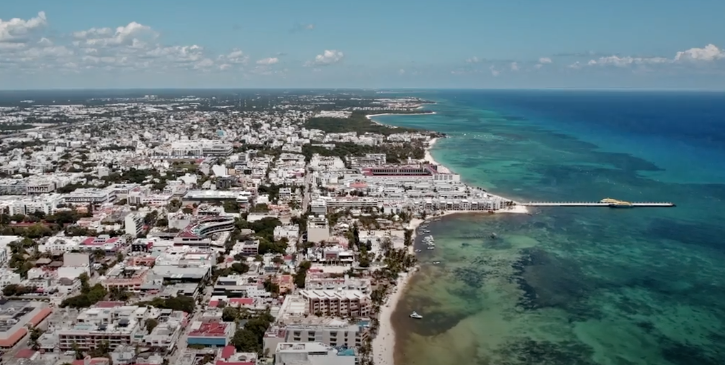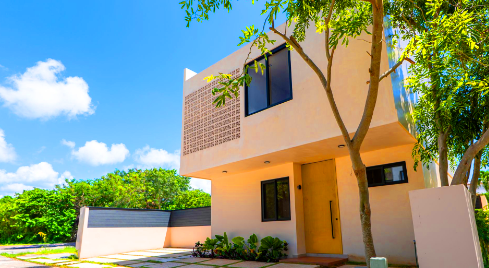"Essential Tips for Foreigners Buying Real Estate in Mexico"
Your Essential Guide on How to Buy Real Estate in Mexico as a Foreigner
Navigating the world of Mexican real estate as a foreign buyer can be complex. Eliminate the guesswork with this essential guide on how to buy real estate in Mexico as a foreigner. We’ll simplify the legalities of the Restricted Zone, demystify financial procedures, and share negotiation strategies, empowering you to confidently secure your property in Mexico.
Key Takeaways
- Article 27 of the Mexican Constitution delineates a Restricted Zone where foreign property ownership is limited, but the Fideicomiso trust system enables foreigners to legally obtain real estate within this zone with specific conditions and renewal options.
- Foreign buyers must undergo legal and financial processes involving permits, trust banks, Escrow Accounts, and adherence to various fees, including setup, annuity, and maintenance associated with the Fideicomiso trust for property transactions.
- Due diligence is crucial in ensuring a smooth real estate transaction in Mexico, encompassing clear property titles, lien and encumbrance checks, negotiation strategies, additional cost assessments, and the journey from reservation agreements to final ownership.
Navigating the Legal Landscape for Foreign Ownership in Mexico

Understanding the country’s unique legal landscape concerning foreign ownership is a key part of exploring the world of Mexican real estate. Article 27 of the Mexican Constitution outlines the Restricted Zone, an area where all foreign investment and property ownership is subject to specific regulations. However, Mexico has devised an innovative legal framework, the Fideicomiso trust system, which enables foreigners to legally hold and manage real estate, even within the Restricted Zone.
To purchase property in Mexico, foreigners need to obtain a Foreign Affairs Permit through a Notario or Trustee Bank. This system, established by the Mexican government, while seeming complex at first glance, is designed to protect the interests of foreign investors, ensuring their rights to the property are respected and upheld under Mexican law.
We will further explore the intricacies of the Restricted Zone and the Fideicomiso trust system in the subsequent sections, equipping you with the necessary knowledge to navigate Mexico’s real estate market.
Understanding the Restricted Zone
The Restricted Zone in Mexico is defined as areas within 100 kilometers of international borders and 50 kilometers of the seacoast, where foreign ownership of land is limited. This limitation, however, does not apply to residential property. Foreign individuals or entities can acquire residential property within the Restricted Zone through a trust fund, or Fideicomiso, for an initial term of 50 years, renewable thereafter.
- On the other hand, Mexican companies with 100% foreign capital are allowed direct ownership of property in the Restricted Zone for residential and non-residential purposes.
Acquiring property as a foreigner within the Restricted Zone necessitates a permit from the Ministry of Foreign Affairs, which includes an agreement to abide by Mexican law as if the foreign purchaser were a Mexican citizen.
The Fideicomiso Trust Explained
The Fideicomiso Trust provides a way for foreigners to purchase property in Mexico’s restricted zones by allowing them to indirectly enjoy the benefits of direct ownership. This tool enables individuals to invest in real estate without the need for citizenship or residency. Ownership through a Fideicomiso grants similar rights as full ownership, such as renovation and selling rights, but requires adherence to specific legal procedures and foreign relations protocols.
In a Fideicomiso, a Mexican bank serves as the trustee, holding the property title and offering the buyer security that the property will not be considered a bank asset in financial distress situations. Selling property held in a Fideicomiso necessitates coordination with the bank to change the beneficiary and compliance with federal approval processes.
Step-by-Step Guide to Purchasing Property with Fideicomiso

With a grasp on the legal landscape, we can now delve into the specifics of purchasing property using a Fideicomiso. The process kicks off after signing the promissory agreement, with the closing coordinator or seller contacting the buyer’s chosen bank to set up the Fideicomiso trust. Once the purchase/sales agreement is executed, the down payment is finalized, which leads to the property title being transferred to the bank should the property be located in the restricted zone and a Fideicomiso trust is necessary.
The funds needed to pay for the real estate transaction, including the down payment and closing costs, are held in an Escrow Account, managed by a Closing Agent. This account is used to disburse these funds at the closing of the sale. Subsequent sections will guide you on choosing your trustee bank and comprehending the fee structure and duration of the Fideicomiso trust.
Selecting Your Trustee Bank
Choosing a trusted Mexican bank as the Fiduciary for a Fideicomiso is crucial as they manage all legal and tax aspects of the real estate transaction. Foreign buyers can select a trustee bank with or without a lawyer, as the bank is capable of guiding them through the Fideicomiso process.
There are various notable trustee banks in Mexico that handle Fideicomisos, including:
- Banco del Bajio
- Monex Grupo Financiero
- Mifel Bank
- Banorte Bank
Selecting a bank trust you can rely on is a crucial step towards finally securing your dream property in Mexico.
Fee Structure and Duration of Fideicomiso
The initial setup cost for a Fideicomiso typically includes a bank fee, a first annuity, and a permit fee from the Ministry of Foreign Affairs. There are also annual maintenance fees for the Fideicomiso, typically required for the ongoing management of assets in the trust and range from $700 to $1,000.
A Fideicomiso trust in Mexico is set for an initial duration of 50 years. The Fideicomiso can be renewed indefinitely, for additional 50-year terms, and the process can be handled through the trustee bank or a closing company.
Financing Options for Foreign Buyers in Mexico
Investing in the Mexican real estate market involves navigating a variety of financing options. Mexican banks offer mortgages to non-residents, although they typically finance only 50% of the property’s value and require a visa among other loan requirements. There are also international options such as Global Mortgage, also known as MoXi, which offers 30-year fixed-rate mortgages to U.S. citizens purchasing properties in Mexico, featuring fully amortized terms without hidden fees or foreign exchange risks as loans are serviced in USD.
For those looking to buy property in Riviera Maya, developer financing may be an option, involving large down payments and balance payments spread over several years with interest rates typically between 6% and 10%. It’s also worth noting that presale real estate investment transactions in Mexico can offer flexible payment arrangements and discounts for substantial upfront investments.
Financing options in the USA for Mexican property include:
- Cash-out refinancing
- Home equity loans
- HELOCs
- Personal loans
Each option has varying interest rates and potential additional charges. Some foreign buyers in Mexico also pursue shared financing arrangements, partnering with family, friends, or other investors to facilitate property acquisition.
The Importance of Due Diligence in Real Estate Transactions

One of the cornerstones of a successful Mexico real estate transaction is conducting thorough due diligence. This process ensures clear property ownership, no existing liens or encumbrances, and compliance with local laws. The due diligence process involves collaboration with professionals such as local real estate agents familiar with the market, lawyers for legal matters, and surveyors or architects for inspections.
An integral part of due diligence includes performing a title search to identify any easements or rights of way and conducting thorough building inspections to assess structural integrity. While not mandatory by law, the costs for due diligence services, including legal assistance and property inspections, are advisable investments to prevent future complications.
Subsequent sections will guide you through the specifics of conducting title verification and lien and encumbrance checks, preparing you to effectively navigate the due diligence process.
Conducting Title Verification
In Mexico, the official title deed is known as ‘Escritura Pública’ or ‘Escritura de Compraventa’, a legally binding document that proves property ownership. To ensure the Escritura Pública’s authenticity, verification can be done by contacting a local notary and through the local Public Registry of Property, which holds all real estate transactions and ownership records.
Lawyers, notarios, and the buyer’s attorney are pivotal in conducting due diligence on the property title, resolving complexities of transactions, and ensuring the legal status of the property is clear. A thorough title review involves checking the property’s history, verifying clear ownership, and ensuring proper documentation is presented to a notary and filed at the public registry.
Lien and Encumbrance Checks
When examining a property title in Mexico, it is crucial to check for any outstanding debts or liens, including unpaid mortgages, property taxes, or homeowner association fees, to ensure they do not become the responsibility of the new owner. A No Liens Certificate and proof of non-debt from the Municipal Public Works and water and electric companies must be obtained to ensure there are no liens on property tax, water, or homeowners association fees. Acquiring title insurance can provide an additional layer of protection for the buyer in such situations.
To avoid future claims, documentation such as a Termination of Services or Employment Contract must be provided if the previous owner had employees working on the property. Thus, extensive due diligence in Mexico includes comprehensive research and gathering of certificates to confirm the absence of any claims, liens, or encumbrances that could affect ownership.
Mastering Negotiations in the Mexican Real Estate Market

Entering the Mexican real estate market requires a strong understanding of negotiation dynamics. Here are some key points to keep in mind:
- Asking prices often differ from sale prices, and with no MLS in Mexico be sure to ask your buyer's agent what the last unit sold for.
- Some Mexican properties may be overpriced, leading them to remain on the market for extended periods if the owner is unwilling to negotiate.
- Inflated initial asking prices may need time to be adjusted to more realistic market values through negotiations.
Cash buyers often hold more leverage during negotiations, as outright purchases are common among foreigners. The seller’s reasons for selling and the buyer’s motivation for buying can greatly influence the negotiation process in property sales. Successful negotiations typically require patience and flexibility, as sellers may be able to wait for their desired price due to low carrying costs.
We’ll examine the cultural nuances and negotiation tactics in the Mexican real estate market in the subsequent sections, and discuss strategies to achieve a mutually beneficial outcome for clients.
Cultural Nuances and Negotiation Tactics
Understanding the cultural nuances and negotiation tactics can significantly influence the outcome of your real estate transaction. Foreign buyers can achieve more effective negotiations by understanding property values according to local Mexican market conditions, as opposed to comparisons with their home country. Firsthand experience living in the area of interest provides buyers with the knowledge needed to negotiate better prices.
Knowing the methods sellers use to assess property values can equip buyers with important leverage during negotiations. The cultural norm in Mexico includes bargaining, and it is customary to make an offer below asking price without giving offense. Mexican negotiations often involve a back-and-forth interaction that is considered part of the local bargaining culture. Property prices are commonly negotiable, and making an offer is a significant step in showing serious interest in a property.
Achieving a Win-Win Outcome
A win-win outcome in negotiations requires transparency, flexibility, and patience from both buyers and sellers. Both parties should practice transparency about their reasons for the real estate transaction to foster a fair and amicable deal environment. Direct negotiation is the mechanism through which the final transaction price is determined, balancing the minimum acceptable sale price for the owner with what the buyer is willing to invest.
Buyers should be ready to seek alternative properties, such as resale property, when encountering overpriced real estate or sellers who are unwilling to negotiate terms, ensuring they can still achieve positive outcomes. It is common for the negotiation process in Mexico to be drawn out, as sellers may not feel pressure to sell quickly due to low property maintenance costs.
Additional Costs and Taxes in Mexican Real Estate Transactions

Apart from the purchase price and financing costs, there are additional costs and taxes in Mexican real estate transactions that buyers should be aware of. In addition to closing costs and acquisition tax, foreign buyers in Mexico may face a non-resident surcharge when purchasing property.
In the subsequent sections, we’ll guide you on estimating these closing costs and understanding acquisition tax and other levies.
Estimating Closing Costs
Closing costs in Mexico for owning property via a Fideicomiso are typically between 5% and 8% of the purchase price and include:
- Initial trust setup fee
- Annual maintenance fees
- Permit and registration fees
- Public registry charges
- Appraisal costs
- Notary fees
- City land acquisition tax based on a percentage of the purchase price
- Public Registry Rights for the registration of the property, which varies based on location and may include additional lien registration fees.
Buyers may be required to advance about half of the closing cost estimate to the notary for out-of-pocket expenses. The closing costs, which can be considered as real estate fees, include:
- Transfer tax: 2%-3% State Tax
- Trust Permit: approximately $2,000
- Foreign Investment Registry: approximately $700
- Trustee Bank Acceptance Fee: around $550
- First Year’s Trust Fee: around $550
- Non-Encumbrance Certificate: approximately $15
- Preventative Notice Advice from the Land Registry Office: approximately $30
Registration Fees in the Land Registry Office range from 0.5% to 1.0% depending on the transaction size and location. Notary’s fees in Mexico range from 0.5% to 1% of the transaction size.
Understanding Acquisition Tax and Other Levies
Mexico’s Property Acquisition Tax, known as ISAI (Impuesto Sobre Adquisición de Inmuebles), typically ranges from 2-5% of the property’s assessed value, which can be lower than the market listing price. The Annual Property Tax, locally known as Predial, is a tax obligation due by March 31 each year, based on property size and location, with incentives for paying early between January and February.
Financial due diligence for buying property in Mexico includes verifying that property taxes and homeowner association fees are up to date to prevent any outstanding liabilities from transferring to the new owner.
Rental income in Mexico is subject to a 25% withholding tax for nonresident owners, with no deductions allowed for expenses. The ISR Tax on residential properties in Mexico is approximately 6.5 pesos per 1,000 pesos of the assessed property value.
Capital Gains Tax in Mexico can be calculated in two ways: 25% of the transaction’s declared value or 30% of the net value, which is the difference between the assessed value at the point of purchase and at sale.
Be sure to ask you real estate buyer's agent for a reputable tax attorney who can take advantage of Mexico's numerous and legal tax loop holes.
The Journey from Reservation to Ownership
The journey from reservation to ownership is an exciting one, filled with pivotal steps that progressively bring you closer to your dream property. The reservation process in Mexico typically includes the following steps:
- Signing a reservation agreement
- Paying a refundable deposit to hold the property
- Making an initial deposit, generally between $5,000 to $10,000 USD, into escrow shortly after the offer is accepted or directly to a reputable developer's account.
After the reservation, the purchasing process includes the following steps:
- Signing a promissory contract that details the terms of the sale and the commitment to purchase.
- Signing the deed in front of a notary public and making the complete payment for the property.
- Closing the transaction by funding the balance of the purchase price and closing costs, resulting in notarial documentation for title transfer.
- Registering the updated deed with the relevant offices, settling all necessary taxes, and issuing a simple copy of the trust deed to the purchaser.
Making the Initial Earnest Money Deposit
In Mexico, upon acceptance of an offer to buy property, an earnest money deposit is made to show the buyer’s good faith and intention to complete the real estate transaction. To reserve the selected property, the buyer makes a reimbursable deposit of $5,000 in earnest money. This deposit is typically held by either the real estate agent or the buyer’s attorney and is an integral part of the reservation process.
Making an earnest money deposit is a critical step in solidifying the buyer’s interest and moving forward in the real estate asset acquisition process in Mexico.
Finalizing the Promissory Agreement
The promise agreement (Contrato de promesa) in Mexico secures a committed timeframe for completion of the sale and establishes the basic terms between buyer and seller. Once signed, the promissory agreement legally commits both parties, and backing out could result in penalties, ensuring a level of certainty in the transaction process.
A typical promissory agreement includes:
- The agreed purchase price
- Property description
- Payment terms
- Responsibilities of each party involved in the transaction
The attorney’s instructions are critical in guiding the buyer throughout the review of the promissory agreement, helping them understand its contents, and ensuring proper signature and execution.
Completing the Down Payment
Completing the down payment in Mexico typically involves transferring a negotiated percentage of the purchase price to the seller or an escrow account, following the deduction of the earnest money deposit. After making the down payment, acquiring a receipt from the seller or developer is essential as it serves as proof of the executed payment. This receipt should explicitly detail the amount transmitted and include any terms agreed upon, ensuring transparency and clear record-keeping.
Maintaining the down payment receipt in a secure and organized manner is crucial, as it is likely to be requested in subsequent stages of the property purchase process or is necessary for tax documentation.
Summary
Navigating the Mexican real estate market as a foreigner may seem challenging, but with the right knowledge and guidance, it can be a rewarding journey. From understanding the legal landscape for foreign ownership to mastering the art of negotiation, each step brings you closer to owning your dream property. By conducting thorough due diligence, selecting the right trustee bank, and understanding the tax and additional costs involved, you can ensure a smooth and successful property acquisition in Mexico.
This comprehensive guide has hopefully demystified the process of buying real estate in Mexico as a foreigner. Armed with this information, you are well on your way to becoming a property owner in the beautiful landscapes of Mexico. Remember, it’s not just about buying property; it’s about investing in a lifestyle, a culture, and a community that welcomes you with open arms.
Frequently Asked Questions
Can foreigners buy property in Mexico?
Yes, foreigners can buy property in Mexico as long as it's outside the restricted zones, with the same rights and responsibilities as Mexican nationals.
Is it hard to buy real estate in Mexico?
Foreigners can face restrictions on purchasing property in certain areas of Mexico, such as the "restricted zone" near borders and coastlines, but they can establish ownership through a bank trust or a Mexican corporation.
Can you buy a house in Mexico with American money?
Yes, you can buy a house in Mexico using American credit and manage the process from the United States. It is possible to purchase property in Mexico with American money.
How much money do I need to buy a house in Mexico?
You will need close to $73,556 USD (1,324,000 Million Pesos) to buy a house in Mexico, which is around 80% less than the average cost of buying a house in the U.S. in 2021.
What is the Restricted Zone in Mexico?
The Restricted Zone in Mexico is defined as areas within 100 kilometers of international borders and 50 kilometers of the seacoast, where foreign ownership of land is limited. It's important to be aware of these restrictions if you're considering purchasing property in these areas.












Comments (0)